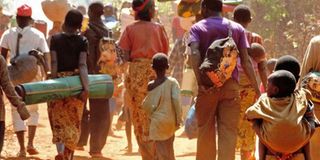Prime
Why more refugees opt for resettlement abroad

A handout picture taken on October 7, 2015 and released a week later by Oxford Committee for Famine Relief shows Burundian refugees walking to Nduta refugee camp in Kigoma, northwest Tanzania. PHOTO | OXFAM | AFP
What you need to know:
- Resettlement, a process where refugees move to a third country for security, health, and social reasons, has become an appealing option for many seeking a chance at a better life
Dar es Salaam. The benefits offered to resettled refugees have sparked a growing desire among refugees in Tanzania to pursue their dreams in the countries of their choice.
Resettlement, a process where refugees move to a third country for security, health, and social reasons, has become an appealing option for many seeking a chance at a better life.
Amidst the challenges faced by refugees in camps in Tanzania, a service provider, who wishes to remain anonymous, revealed a surge in the number of refugees expressing a preference for resettlement over repatriation.
The driving force behind this trend, as noted by the service provider, is the influence of relatives who have successfully resettled in countries like the United States and Canada.
Additionally, dissatisfaction with the quality of services in the camps, exacerbated by insufficient funding, has fueled the eagerness of refugees to explore opportunities abroad.
Basic needs provided to resettled refugees in host countries play a pivotal role in attracting individuals like Thomas Manyirakiza, a 34-year-old teacher from Burundi who has spent over a decade in the Nduta camp in the Kigoma region.
Mr Manyirakiza expressed his dream of moving to the United States, citing the improved lives of his fortunate brothers, who now enjoy stability and access to education for their children.
“The food that is brought at the moment is not enough, and sometimes it is only of one type. There are times when we have to use wheat flour to cook ugali, so we eat ugali made of wheat flour. I believe my application will be considered,” said Mr Manyirakiza.
The Burundian emphasises the challenges faced within the camp and his eagerness to provide a better life for his family.
Refugees like Mr Manyirakiza are hopeful that resettlement will provide opportunities for personal and professional growth.
The support received during the initial 90 days in the United States, including assistance in obtaining Social Security cards, enrolling children in school, and adapting to community life, is seen as a game changer for those seeking a fresh start.
The trend of resettlement is evident in the statistics provided by the Refugee Services Department in the Ministry of Home Affairs for 2023.
From January to August 2023, over 800 refugees have been resettled, with the majority choosing destinations in the United States and Canada.
This increase is reflective of a global trend, with the United Nations Refugee Agency projecting that over two million refugees will require resettlement in the coming year. The 2023 figure represents a 36 percent increase compared to resettlement needs for this year of 1.47 million, according to the Projected Global Resettlement Needs Assessment for 2023 released recently by the UNHCR.
This rise, the report says, is attributed to the humanitarian impacts of the pandemic, the multitude of various protracted refugee situations, and the emergence of new displacement situations over the past year.
Most needs in 2023 are from countries hosting large refugee populations across the African continent, with Tanzania, a signatory to the 1951 Refugee Convention, playing a significant role. Some 662,012 refugees hosted in Tanzania are estimated to be in need of resettlement.
Tanzania has been home to one of the largest refugee populations in Africa for the past 40 years, with over 200,000 refugees in need of resettlement or humanitarian assistance.
The protracted caseload of Congolese refugees in the Nyarugusu Refugee Camp, spanning more than two decades, is also a focus of the resettlement programme.
The Ministry of Home Affairs believes that addressing the refugee problem requires a comprehensive approach, including voluntary repatriation, local settlement, and resettlement in third countries.
“The aim is to provide durable solutions and empower refugees to rebuild their lives with dignity and opportunities for a brighter future,” said Assistant Director in the Refugee Service Department, Commissioner of Police Nsato Marijani.




